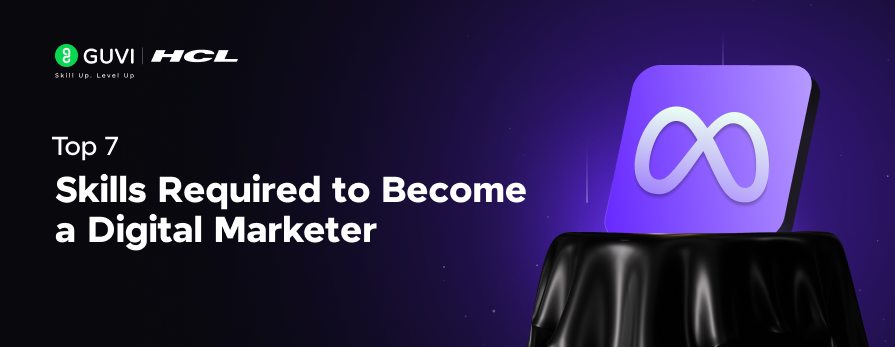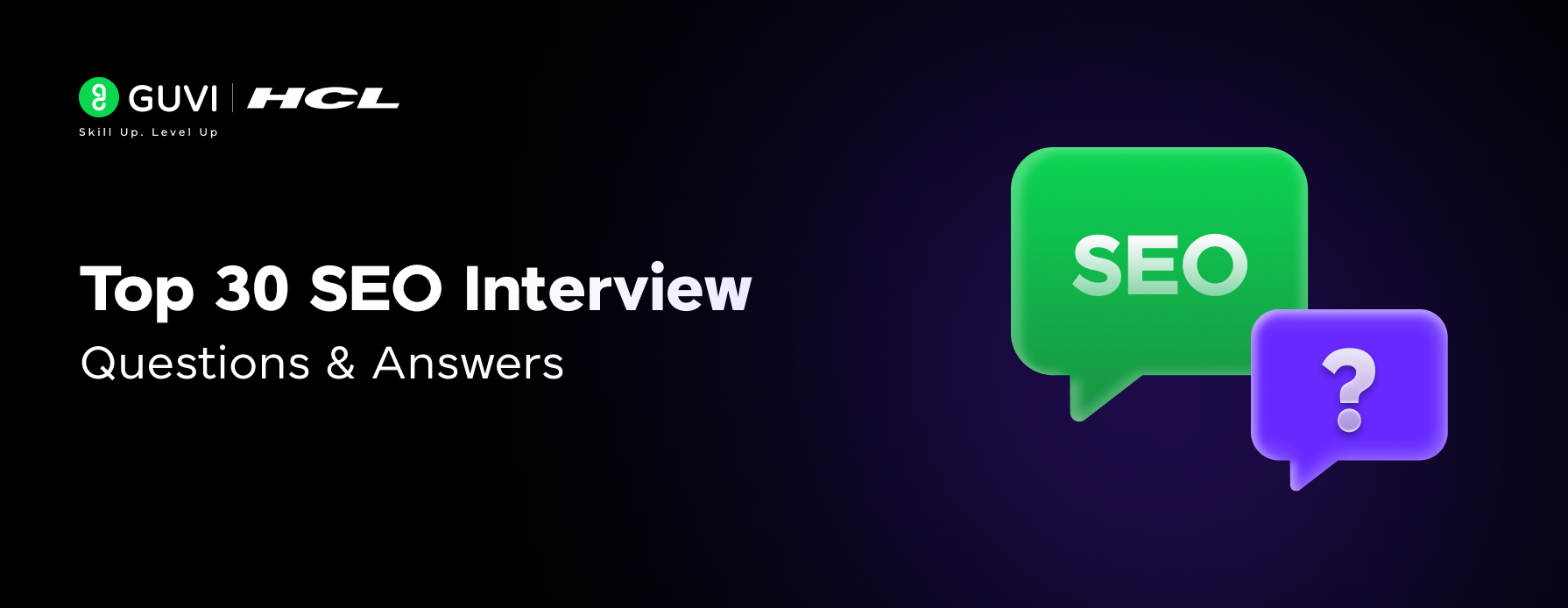
The Top 15 Most Important SEO Ranking Factors in 2025
Apr 17, 2025 10 Min Read 7547 Views
(Last Updated)
The landscape of SEO is changing constantly with the change in technology and the way people choose to interact with the content available online. Thus, it becomes a tedious task for all our SEO enthusiasts, learners, and professionals to keep up with the changes and try to bag that top spot in the search engine’s SERP.
That’s where the SEO ranking factors come into play. There are the key determinants or SEO best practices that you should be implementing to ensure that your content gets the most visibility, organically on the search engines. But that’s where the problem comes in. Not many people are aware of the key SEO ranking factors that they must specifically focus on.
That’s why, we reached out to Mr Ramkumar, our SEO manager to understand what makes Google or any search engine rank our website. Throughout this blog, we’ll be sharing his exclusive take on the latest SEO ranking factors and the best ways to optimize your site so that it fulfills the ranking criteria. So, let’s get started.
Table of contents
- Most Important SEO Ranking Factors
- Content Depth and Comprehensiveness (On-Page SEO)
- Semantic Search Optimization (On-Page SEO)
- E-E-A-T Principle (On-Page SEO)
- Matching User Intent (On-Page SEO)
- LLM Optimization (On-Page SEO)
- Content Freshness (On-Page SEO)
- Content Originality (On-Page SEO)
- Helpful Content (On-Page SEO)
- Core Web Vitals (Technical SEO)
- Structured Data Markup (Technical SEO)
- Voice Search Optimization (Technical SEO)
- Mobile Friendliness (Technical SEO)
- User Experience Signals (Technical SEO)
- High-Quality Backlinks (Off-Page SEO)
- Brand Signals (Off-Page SEO)
- Concluding Thoughts
- FAQs
- What are the most important SEO ranking factors in 2025?
- How does Google evaluate the quality of content?
- Why is mobile optimization crucial for SEO?
- How can I improve my website's Core Web Vitals?
- What role do backlinks play in SEO?
Most Important SEO Ranking Factors
Now, we know that there are almost 200+ SEO ranking factors that determine if your website is ranking or not. Some of them have a major impact, while others are essential, but not necessary.
So, when we asked about the most important SEO ranking factors in 2025 from Mr Ram, he mentioned the following new and updated key ranking pointers, based on his own experience and research of the changing SEO trends:
Also Read | The Best B2B Digital Marketing Strategies That You Need to Adopt in 2025
1. Content Depth and Comprehensiveness (On-Page SEO)
In the vast field of SEO, the depth and comprehensiveness of your content are not just buzzwords. Now, they’re the foundational elements that dictate your website’s success. This crucial factor goes beyond mere word count, delving into how thoroughly a piece of content addresses the user’s query.
A well-crafted, in-depth article when covers a topic from multiple angles, tells the search engines that your site is a valuable resource. Mr Ram suggests that it’s about creating content that serves as the ultimate guide on a subject, leaving no question unanswered and no stone unturned. A reader should not need to leave your site in between in search of a better answer.
Moreover, comprehensive content naturally incorporates a variety of related keywords and topics, enhancing its visibility and relevance in search engine algorithms. By meticulously covering all facets of a topic, your content becomes a magnet for quality backlinks, further bolstering its authority and ranking potential.
Importance of Content Depth and Comprehensiveness as an SEO Ranking Factor
- Drives higher engagement by providing thorough answers.
- Encourages backlinks and social shares due to its value.
- Enhances visibility through comprehensive keyword coverage.
- Signals expertise and authority on the subject matter.
Also Read | Watch Out For These Digital Marketing Trends in 2025 or You’ll Miss Out!
2. Semantic Search Optimization (On-Page SEO)
The evolution of search engines into more intelligent, context-aware systems means that they can now discern the intent behind a user’s search with remarkable accuracy. That’s why, optimizing your content for semantic search has become a major SEO ranking factor. Using an SEO rank tracking tool can help you monitor your rankings and adjust your strategy accordingly.
Semantic search optimization is the art of refining your content to align with the intent behind user queries, rather than merely matching keywords. This approach requires a deep understanding of how your audience phrases their searches and the context surrounding those queries.
Now, search engines place a premium on content that can engage in a meaningful dialogue with the user, answering both explicit and implicit questions. It’s about anticipating the questions that might not be directly asked but are implied and providing answers that are both relevant and enriching.
Hence, by optimizing for semantic search, you’re essentially ensuring that your content comprehensively addresses the nuances of your audience’s needs.
Importance of Semantic Search Optimization as an SEO Ranking Factor:
- Enhances content discoverability through context and relevance.
- Increases user engagement by addressing implied questions.
- Improves content relevance for voice and conversational searches.
- Strengthens content authority by covering topics in depth.
Also Explore: Voice User Interface (VUI) Design: Crafting Conversational Experiences
Enrolling in GUVI’s Digital Marketing course can help you become an expert in the digital world, regardless of your level of marketing expertise. Learn the ins and outs of email marketing, social media marketing, content production, SEO, and more from professionals in the field. Through practical projects and real-world case studies, acquire job-ready skills with globally recognized certifications.
Instead, if you want to explore Marketing Research Techniques through a Self-paced course, try GUVI’s Marketing Research Techniques certification course.
3. E-E-A-T Principle (On-Page SEO)
The E-E-A-T (Experience, Expertise, Authoritativeness, Trustworthiness) principle stands at the core of Google’s guidelines, serving as a benchmark for assessing content quality and reliability. In short, experience refers to the creator’s experience in the niche, expertise points to the creator’s knowledge in the specific field, authoritativeness is about the content quality and the creator’s reputation among peers, and trustworthiness evaluates the accuracy and legitimacy of the website and its content.
In an era where misinformation can spread rapidly, E-A-T is Google’s way of ensuring that users receive content that is not only informative but also reliable and created by credible sources. This principle is particularly crucial in YMYL (Your Money or Your Life) topics, where inaccurate information could significantly impact a person’s health, safety, or financial stability.
To excel in E-E-A-T, content creators must demonstrate comprehensive knowledge and provide evidence of their expertise and credentials. Websites should be transparent about their authors, cite reputable sources, and maintain a high standard of information integrity.
Importance of EEAT Principle as an SEO Ranking Factor:
- Builds user trust and confidence in the content.
- Enhances content credibility and authority in its niche.
- Critical for ranking in YMYL topics and industries.
- Supports long-term SEO success by establishing a reputable online presence.
Also Read | Best Way to Learn Digital Marketing in 2025
4. Matching User Intent (On-Page SEO)
Today, your content will rank only if it offers what exactly the user has in mind. Matching user intent is about aligning your content with the specific needs and desires of your audience at the moment they perform a search.
This concept transcends mere keyword matching, delving into the why behind a search query. There are generally four types of search intent: informational, navigational, transactional, and commercial investigation.
Understanding and catering to these intents can significantly boost your content’s relevance and value in the eyes of both users and search engines. For instance, a user looking for a “how-to guide on baking a cake” is seeking informational content, whereas someone searching for “best cake baking tools” is likely in a commercial investigation phase.
Optimizing for user intent involves a deep dive into keyword research, audience analysis, and the customer journey. You’ll need to craft content that guides the user to the next logical step while answering the initial query, whether that’s reading another related article, signing up for a newsletter, or making a purchase. This way, you can also generate revenue through organic marketing.
Importance:
- Directly impacts content visibility and ranking in search results.
- Increases user satisfaction and engagement by providing relevant answers.
- Enhances the likelihood of conversions by aligning with the user’s stage in the buying journey.
- Reduces bounce rates by closely matching the search query’s intent.
Also Read | Best Digital Marketing Projects to Become a Pro Digital Marketer
5. LLM Optimization (On-Page SEO)
The latest chapter in the handbook of SEO is LLM Optimization, or optimization for Large Language Models, which is becoming increasingly important as search engines begin to leverage these advanced AI models to understand and rank content.
The key to LLM Optimization lies in understanding that these models prioritize content that offers a seamless user experience, with clear, concise, and informative answers to search queries. It’s about moving beyond keyword stuffing and focusing on creating genuinely useful content that addresses the user’s intent comprehensively.
These models are designed to grasp the nuances of human language, allowing them to evaluate the quality, relevance, and value of content in a way that mimics human judgment. Optimizing for LLMs means your content should be understood by AI language models.
The created content should be rich in information and keywords, structured and written in a way that these models recognize as valuable and authoritative. This means focusing on natural language use, contextually relevant information, and a coherent narrative structure that provides clear answers to user queries.
Importance:
- Enhances content’s visibility and ranking in AI-driven search results.
- Improves user engagement by providing clear, concise, and relevant information.
- Increases content’s authority and trustworthiness in the eyes of both users and search engines.
- Adapts your SEO strategy to the evolving landscape of AI in search.
6. Content Freshness (On-Page SEO)
Content freshness is a critical factor in SEO, reflecting the importance of keeping your website’s content up-to-date and relevant. Search engines, particularly Google, favor websites that regularly update their content, as this indicates that the site is active and providing current information to users.
Freshness doesn’t necessarily mean rewriting every piece of content from scratch; it can also involve updating statistics, adding new sections to reflect recent developments, or revising outdated information. This approach ensures that your content remains valuable and relevant to your audience, enhancing its visibility and ranking in search results.
Moreover, regularly updated content signals to search engines that your website is a reliable source of information, which can improve your site’s overall SEO performance. It’s especially crucial for topics that are rapidly evolving, where new information can significantly impact the content’s accuracy and usefulness.
Importance of Content Freshness as an SEO Ranking Factor:
- Signals to search engines that your website is providing up-to-date information.
- Enhances user engagement by offering the most current and relevant content.
- Improves the perceived authority and reliability of your website.
- Significantly leads to higher rankings in search results for queries where freshness is a significant factor.
Also Explore: Top 9 AI Tools for Content Creation That You Shouldn’t Miss
7. Content Originality (On-Page SEO)
Content originality is paramount in the vast digital landscape, where the uniqueness and authenticity of your content can set you apart from the competition. Search engines like Google place a high value on original content, rewarding websites that offer unique insights, perspectives, or information not found elsewhere.
Avoiding plagiarism isn’t the only focus of original content. It’s about creating something of value that reflects your brand’s voice, expertise, and understanding of the audience’s needs. This approach serves your SEO performance positively, building trust and loyalty with your audience. Thus, establishing your site as a go-to resource in your niche.
The drive for originality should permeate every piece of content you produce, from blog posts and articles to videos and infographics. It involves a deep dive into topics, providing in-depth analysis, personal anecdotes, or data-driven insights that contribute something new to the conversation.
Importance of Content Originality as an SEO Ranking Factor:
- Significantly boosts SEO by differentiating your content in search engine rankings.
- Establishes your brand as an authoritative and trusted source in your industry.
- Enhances user engagement and encourages social sharing and backlinks.
- Protects against algorithm penalties associated with duplicate content.
Also Read | A Guide on Creating the Most Compelling Marketing Content
8. Helpful Content (On-Page SEO)
The concept of helpful content has taken center stage in SEO, emphasizing the creation of content that genuinely meets the needs and solves the problems of your audience. This shift towards user-centric content is a response to search engines’ evolving algorithms, which now prioritize the value and utility of content in ranking decisions.
Helpful content is defined by its ability to answer questions, provide solutions, and offer insights that users find beneficial and relevant to their search queries. It’s about moving beyond superficial coverage of a topic to delivering in-depth, actionable content that enhances the user’s knowledge or helps them make informed decisions.
Mr. Ram said that to create helpful content, one needs to possess a deep understanding of their audience’s pain points, questions, and search intents. The crafted content should be informative, engaging, and accessible, which makes complex information easy to understand and apply.
Importance:
- Directly impacts your website’s ranking by aligning with search engines’ emphasis on user satisfaction.
- Increases user engagement and time spent on your site by providing valuable information.
- Builds trust and credibility with your audience, establishing your site as a reliable resource.
- Encourages social sharing and backlinks, further enhancing your SEO efforts.
Must Read: Best Software Tools for Writing: Elevate Your Writing Skills
9. Core Web Vitals (Technical SEO)
Core Web Vitals have emerged as a pivotal set of metrics for evaluating a website’s overall user experience, directly influencing its SEO ranking. These vitals measure the speed, responsiveness, and visual stability of a page, providing a quantifiable gauge of the user experience.
The three main Core Web Vitals are:
- Largest Contentful Paint (LCP), which measures loading performance
- First Input Delay (FID), which assesses interactivity
- Cumulative Layout Shift (CLS), which evaluates visual stability
Addressing Core Web Vitals requires a comprehensive approach to website design and development, focusing on speed, efficiency, and stability. This might involve optimizing images and videos, minimizing CSS and JavaScript, and ensuring responsive and stable page elements.
Importance of Optimizing Core Web Vitals as an SEO Ranking Factor:
- Directly impacts SEO rankings by reflecting the quality of the user experience.
- Enhances user satisfaction by providing a fast, interactive, and stable browsing experience.
- Reduces bounce rates and improves conversion rates by addressing user experience issues.
- Increases visibility in search results by meeting Google’s performance standards.
Find Out All About Optimizing Website Performance: 9 Strategies for Faster Loading User Interfaces
10. Structured Data Markup (Technical SEO)
Structured data markup, a powerful tool in SEO, involves implementing a specific code format—usually Schema.org vocabulary—to help search engines understand the content of your website more effectively.
This markup provides search engines with explicit clues about the meaning of a page and its content, enabling them to display your site more prominently in search results through rich snippets, which can include star ratings, product prices, or event dates.
The implementation of structured data is not just about improving visibility; it’s also about facilitating a deeper understanding of your site’s content, which can lead to more accurate and relevant search results.
Whether you’re detailing articles, products, events, or recipes, structured data helps search engines index your content more effectively, improving your chances of ranking higher in SERPs.
Importance of Structured Data Markup as an SEO Ranking Factor:
- Enhances content visibility and presentation in search results through rich snippets.
- Improves search relevance by providing search engines with detailed content context.
- Increases click-through rates by making search result listings more informative and attractive.
- Supports voice search optimization by making content easily interpretable by AI.
Also Read: The Role of AI in Predictive User Interface Design
11. Voice Search Optimization (Technical SEO)
Voice search optimization is becoming increasingly important as more users turn to voice-activated assistants like Siri, Alexa, and Google Assistant for their search queries. This shift towards voice search requires a different approach to SEO, as voice searches tend to be more conversational and longer than text-based searches.
Optimizing for voice search involves focusing on natural language, question-based queries, and local SEO, as many voice searches are looking for immediate, local solutions. The goal is to structure your content in a way that directly answers the questions users are likely to ask, using a conversational tone that matches the natural speech patterns.
To excel in voice search optimization, it’s crucial to understand the intent behind voice searches and to provide clear, concise, and direct answers to those queries. This might involve creating FAQ pages, optimizing for featured snippets, or using schema markup to highlight relevant information.
Importance of Voice Search Optimization as an SEO Ranking Factor:
- Captures the growing segment of users who prefer voice search for convenience.
- Enhances visibility in local search results, crucial for businesses serving specific areas.
- Increases the chances of being featured in direct answers and featured snippets.
- Improves user experience by providing quick and relevant answers to queries.
12. Mobile Friendliness (Technical SEO)
Mobile-friendliness has become a non-negotiable aspect of SEO as the majority of searches now occur on mobile devices. This shift has prompted search engines to prioritize mobile-friendly websites in their rankings.
With the implementation of mobile-first indexing by Google, the mobile version of your website is now the benchmark for indexing and ranking. This means that your site’s mobile performance directly influences its visibility in search results, making mobile optimization an essential component of your SEO strategy .
A mobile-friendly site is designed to provide an optimal viewing experience across a wide range of devices, featuring easy navigation, fast loading times, and responsive design that adjusts the content layout to fit the screen size of smartphones and tablets.
The goal of ensuring your website is mobile-friendly should not be limited to ranking well in search engines. Mobile friendliness is also about making the website more flexible and accessible, to provide a positive user experience, reach a wider audience, and keep visitors engaged to reduce bounce rates.
Importance:
- Directly impacts your site’s ranking in search results due to mobile-first indexing.
- Enhances user experience by providing a seamless browsing experience on mobile devices.
- Increases the reach of your website to the growing number of mobile users.
- Reduces bounce rates by ensuring quick load times and easy navigation on mobile.
Also Explore: Gestures in UI: What are the Intuitive Touch Controls in Mobile Apps?
13. User Experience Signals (Technical SEO)
User experience (UX) signals encompass a range of factors that indicate how users interact with and perceive a website. They play a crucial role in SEO as they provide search engines with insights into the quality and relevance of a site’s content.
Common User Experience Signals include:
- Page Dwell Time
- Bounce Rate
- Page Load Speed
- Mobile Responsiveness
- Pogo Sticking
- Organic Click Through Rate (CTR)
- Website Security (HTTPS or SSL Certificate)
- Search Intent
- Core Web Vitals
A positive user experience is characterized by a website that’s informative, easy to navigate, engaging and satisfying to use. Improving UX signals involves optimizing both the content and the design of your site to ensure that visitors find what they’re looking for and have a pleasant experience that encourages them to stay longer and explore more content.
Search engines like Google use these signals to gauge a website’s value to users, influencing its ranking in search results. For instance, a high bounce rate might indicate that the site’s content is not relevant to the search query, or a low dwell time could suggest that the content is not engaging enough. Conversely, a high CTR from search results suggests that users find the title and description relevant and compelling.
By focusing on enhancing the overall user experience, websites can improve these UX signals, positively impacting their SEO performance and, ultimately, their visibility in search results.
Importance of UX Signals as an SEO Ranking Factor:
- Directly influences SEO rankings by reflecting the quality of the user experience.
- Impacts user satisfaction, which can lead to higher engagement and conversion rates.
- Provides actionable insights into how users interact with your site, guiding optimization efforts.
- Affects the perceived credibility and authority of your website.
Find Out Impact of Loading Time on User Experience
14. High-Quality Backlinks (Off-Page SEO)
High-quality backlinks are a cornerstone of off-page SEO, serving as one of the most significant indicators of a website’s credibility and authority. A backlink, simply put, is a link from another website to yours. However, not all backlinks are created equal.
High-quality backlinks come from reputable, relevant sites within your industry or niche and signal to search engines that other authoritative entities endorse your content. This external validation boosts your site’s trustworthiness in the eyes of search engines, thereby improving your rankings in search results.
The process of acquiring high-quality backlinks requires strategic effort, focusing on creating valuable, share-worthy content that others naturally want to link to. It also involves outreach and relationship-building with other website owners, bloggers, and influencers in your field.
But Mr Ram warns that here the goal is to encourage organic link-building rather than resorting to artificial or spammy tactics, which can negatively impact your SEO performance. So, just take care of this aspect.
Importance of High-Quality Backlinks as an SEO Ranking Factor:
- Significantly influences search engine rankings by demonstrating your site’s authority and relevance.
- Drives referral traffic, introducing your content to a broader audience.
- Enhances brand visibility and recognition within your industry.
- Contributes to the overall trustworthiness and credibility of your website.
15. Brand Signals (Off-Page SEO)
Brand signals refer to the various online indicators that search engines use to gauge the popularity and credibility of your brand. Strong brand signals communicate to search engines that your brand is reputable, trustworthy, and recognized by users, which can positively influence your SEO rankings.
These brand signals can include:
- Mentions of your brand across the web
- Social media presence and engagement
- Branded searches (when users specifically search for your brand name)
- The consistency of your NAP (Name, Address, Phone number) information across online directories
Developing strong brand signals in the era of online social media shops and e-commerce has become a major SEO running factor for businesses, that require a comprehensive online presence and active engagement strategy.
As per Mr. Ram, it’s all about creating a cohesive and recognizable brand identity across all digital platforms, encouraging user interaction, and ensuring that your brand is mentioned positively across the web.
Importance:
- Enhances search engine rankings by demonstrating brand credibility and authority.
- Increases user trust and loyalty through consistent and positive brand presence.
- Drives more branded searches, which typically have higher conversion rates.
- Improves visibility and recognition in a crowded digital landscape.
Note: These SEO ranking factors are just the most crucial in 2025, as told by our SEO expert. Several other key factors help your website rank. Watch out for those as well.
Join GUVI’s Digital Marketing Course to kickstart your journey in this exciting field. Gain expertise in ChatGPT, WordPress, Meta Business Suite, Google Analytics, Youtube Analytics, Google Ads Manager, and more. Master essential skills in SEO, social media marketing, email marketing, content creation, and digital advertising tactics to excel in the Digital Marketing industry.
Alternatively, if you want to explore Marketing Research Techniques through a Self-paced course, try GUVI’s Marketing Research Techniques certification course.
Concluding Thoughts
As we wrap up our exploration of the top SEO ranking factors for 2025, it’s clear that all these SEO ranking factors play a crucial role in determining your online visibility and success. Just remember, the ultimate goal of SEO is to build a strong foundation for your website, one that provides a user-friendly experience, is easily discoverable in search, and aligns with your users’ needs and expectations.
By focusing on these key SEO ranking factors, you’re not just optimizing for algorithms; you’re creating a brand that users trust, engage with, and return to time and again. Embrace the complexity of SEO with a learner’s mindset, and let your curiosity guide you toward innovative solutions that elevate your SEO game.
Also Read: 8 Steps to Make an Effective Digital Marketing Plan
FAQs
-
The most important SEO ranking factors include content quality and originality, user experience, mobile friendliness, Core Web Vitals, high-quality backlinks, and structured data markup.
-
Google evaluates content quality through the E-A-T principle (Expertise, Authoritativeness, Trustworthiness), content originality, depth, relevance, and the use of structured data to understand the context better.
-
Mobile optimization is crucial because the majority of searches are now performed on mobile devices, and Google uses mobile-first indexing to rank websites.
-
Improve Core Web Vitals by optimizing images, minimizing JavaScript and CSS, leveraging browser caching, and using a content delivery network (CDN) to reduce loading times.
-
Backlinks serve as a vote of confidence from other websites, indicating that your content is valuable and trustworthy, which can significantly improve your site’s search engine ranking.































Did you enjoy this article?